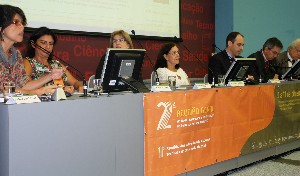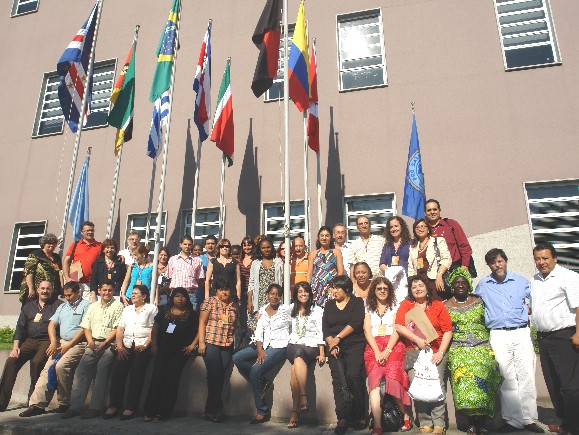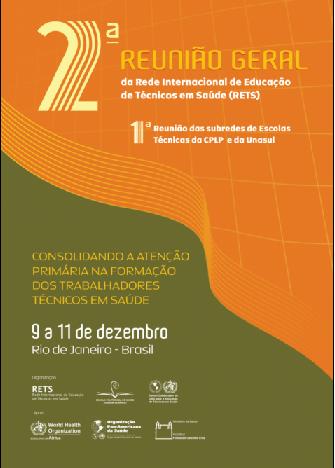2nd International Education Network for Health Technicians General Meeting
1st Community of Portuguese-Speaking Countries and Union of South American Nations Technical Schools Network Meeting
Primary Attention securing on health technicians workers education
The Joaquim Venâncio Polytechnical School of Health (EPSJV /Oswaldo Cruz Foundation) invites all member institutions to attend the 2nd International Education Network for Health Technicians General Meeting (RETS) which will happen from 9 to 11 December 2009 with the 1st Community of Portuguese-Speaking Countries and Union of South American Nations Technical Schools Network Meeting.
The event, being held in Rio de Janeiro, Brazil, will aim to strengthen the overall strategies of cooperation within the Network. In addition to representatives of member institutions of RETS, the meeting will gather national chairpersons responsible for education of health technicians policies and members of the Observatories of Human Resources for Health of the Americas and Africa.
Specific Objectives:
- discuss healthcare technical education regarding the primary attention securing model principles;
- contribute to the human resources in health technical area observatories organization;
- build up research among RETS institutions;
- develop a work plan for the Union of South American Nations technical schools network.
- discuss the work plan operation on Community of Portuguese-Speaking Countries healthcare technical schools network;
- set and agree on a communication plan for RETS and its networks;
- develop a work plan and establish the RETS headquarters technical office for the 2010-2012 period.
The subscription is free and the prospects should fill the application form. There will be Portuguese and Spanish simultaneous translation during the event.
Preliminar Schedule
2nd International Education Network for Health Technicians General Meeting (RETS)/ 1st Community of Portuguese-Speaking Countries and Union of South American Nations Technical Schools Network Meeting
Date: from 9 to 11 December 2009.
Place: Joaquim Venâncio Polytechnical School of Health (EPSJV/ Oswaldo Cruz Foundation)
Address: Av. Brasil, 4365 - Manguinhos - Rio de Janeiro - RJ - 21040-360 - Brazil
Telephone number: 55 (21) 3865-9730
Email: cci@epsjv.fiocruz.br
Strengthening and Expansion of the Network are the main themes of the 2nd General Meeting of the RETS
During the meeting that took place December 9-11 at the Joaquim Venancio Polytechnic Health School (EPSJV/Fiocruz) in Rio de Janeiro, Brazil, there were defined the work plans of the RETS and the sub-network of the Health Technical Schools of the Union of South American Nations (Unasul) and of the Community of Portuguese Language Countries (CPLP) for the next Triennial. Among the decisions made by the participants of the meeting, one of the highlights was the reconduction of the EPSJV as the Network’s Executive Secretariat up until the end of the year 2012.
Besides the exclusive meetings for the representatives of the institutions that are part of the RETS, the event’s program was composed of a lecture and three round-tables open to the public in general, which presentations and videos are listed at the end of this article, together with the documents produced in the reunion.
 Specialists discuss the different aspects of technical education
Specialists discuss the different aspects of technical education
In the morning of December 9, after the event’s opening ceremony, the director of the International Relations Center for Health (CRIS) of Fiocruz and the Brazilian representative in the Coordination Committee of Unasul-Health, Paulo Buss, and the Cooperation director of the CPLP, Manuel Lapão, under the coordination of André Malhão, ex-director of the EPSJV, presented the lecture “The Health technical cooperation on the scope of the Unasul and CPLP”. After telling a little bit about the history of the creation of the Unasul and Unasul-Health, Buss highlighted the importance of the formation of a structuring network in the technical health education area, as a effective tool of improvement of the South American health national systems. About the same issue, Lapão (on the left) talked about the countries of CPLP, presenting the Strategic Plan for Health Cooperation (PECS), approved in 2009.
Coordinated by Clarice Ferraz of the Brazilian Ministry of Health, the round-table “Primary health care experiences in education” that took place in the afternoon of December 9, José Marin Masollo of the Paraguayan Ministry of Public Health and Social Well-Being (on the right), talked about the recent changes in the health public policy in his country and its results on the population health indicators. It was followed by the vice-director of Education and Information of the EPSJV, Márcia Valéria Morosini, that talked about the Brazilian model of education and work management of community agents, specially about the discrepancies over the nature of this professional. Finally, the dean of the Faculty of Health Technology of Cuba, Julio Portal Piñeda, traced the origins of the education in health technologies in his country, highlighting the strong articulation between education and the provision of health services.
Closing the first day of the meeting, the round-table “The culture issue in the health worker’s education”, coordinated by the director of the EPSJV, Isabel Brazil, had the participation of the director of the Women’s History and Participation Workshop – Tahipamu, Ineke Dibbits, and of Rafael Vilas-Boas, professor of the University of Brasília (UNB). Ineke Dibbits, who is Dutch, talked about the interculturality in the education of health workers in Bolivia – country that she chose to live. Vilas-Boas talked about the articulation between politics and culture in the education of farm workers in Brazil.
In the morning of December 11, it was presented the round-table “The production of knowledge about technical health workers: the importance of human resources in health”, coordinated by the director of the Observatory of Human Resources of the Social Medicine Institute of the State University of Rio de Janeiro (IMS/Uerj), Célia Regina Pierantoni. Giovanni Escalante of the PAHO-Peru representation then presented the process of the formation of the Andean Network of Observatories of Human Resources in Health ‘Edmundo Granda’, and Monica Vieira, coordinator of the Observatory of Health Technical Workers of the EPSJV, talked about the importance of the work developed in the technical workers observatory and presented the result of many researches already finished or in progress.
Members of the Network outline directives for the future
During the meeting, it was defined the work plan of the Network for the 2010-2012 period that is divided into three axis: ‘Strengthening, Expansion and Dissemination of the RETS’, ‘Communication and Production of Information and Knowledge’ and ‘Production, Dissemination and Exchange of Knowledge in the Technical Education area’.
In the first axis, whose goal is to expand and strengthen the RETS in the Americas region, Caribbean and Africa, there are planned strategies such as the consolidation of the actions of technical cooperation in the countries that are already part of the Network; the search for new members and partners that could be part of RETS; the dissemination of the Network and the constitution of the sub-networks of health technical schools of the CPLP and Unasul.
In the communication aspect, the goal is to develop and improve the mechanism that facilitate the production of information and the communication among the members of the RETS and among the network and the general public. Among the strategies devised, there is the creation of the Editorial Council for the RETS magazine and changes in the network site, aiming at making the process of updating the information faster and increasing the interactivity with the users.
In the third axis, the objective is to foment the development of researches to consolidate the academic production in the technical education area, to subsidize the formulation of public policies in the countries and to establish technical cooperation among the member institutions. Among the strategies to be adopted, there are included: the elaboration of a glossary of definitions and the classification of existing technical professions in the Americas, Caribbean and the Portuguese Language countries; the incentive for the creation of a Network of Observatories of Human Resources, besides the strengthening of the existing ones; stimulus of the technical cooperation for the production of didactic material; and the identification of potentialities, needs and demands in strategic areas for the education of the technicians aiming at establishing interinstitutional partnerships; exchange and mobility of professors, students and technicians between the member institutions.
 By unanimity and with many compliments for its performance since 2005, the participants of the meeting voted for the reduconduction of the EPSJV as the Executive Secretariat of the RETS for the next 3 years.
By unanimity and with many compliments for its performance since 2005, the participants of the meeting voted for the reduconduction of the EPSJV as the Executive Secretariat of the RETS for the next 3 years.
Presentations:
1rst day: 12/09
Lecture: “The Health technical cooperation on the scope of the Unasul and CPLP”.
- ‘The technical cooperation in health within Unasul', Paulo Buss
- ‘The technical cooperation in health within CPLP’ (part 1 an part 2), Manuel Lapão
Round-table “Primary health care experiences in education”
- 'Public Policies for Quality of Life and Health with Equidty', José Marin Masollo (Spanish)
- 'Considerations on the formation and management of the health agents in Brazil', Márcia Valéria Morosini (Portuguese)
- 'The Impact of Technology in Health in Primary Care', Julio Portal Piñeda (Spanish)
Round-table “The culture issue in the health worker’s education”
- 'The intercultural training of health workrs in Bolivia', Ineke Dibbits (Spanish)
Day 12/11
Round-table “The production of knowledge about technical health workers: the importance of human resources in health”
- 'The experience of Andean Observatory', Giovanni Escalante (Spanish)
- 'The Observatory of Technical Health Workers', Mônica Vieira (Portuguese)
Videos:
- Lecture: “The Health technical cooperation on the scope of the Unasul and CPLP”.
- Round-table “Primary health care experiences in education”
- Round-table “The culture issue in the health worker’s education”
- Round-table “The production of knowledge about technical health workers: the importance of human resources in health”

